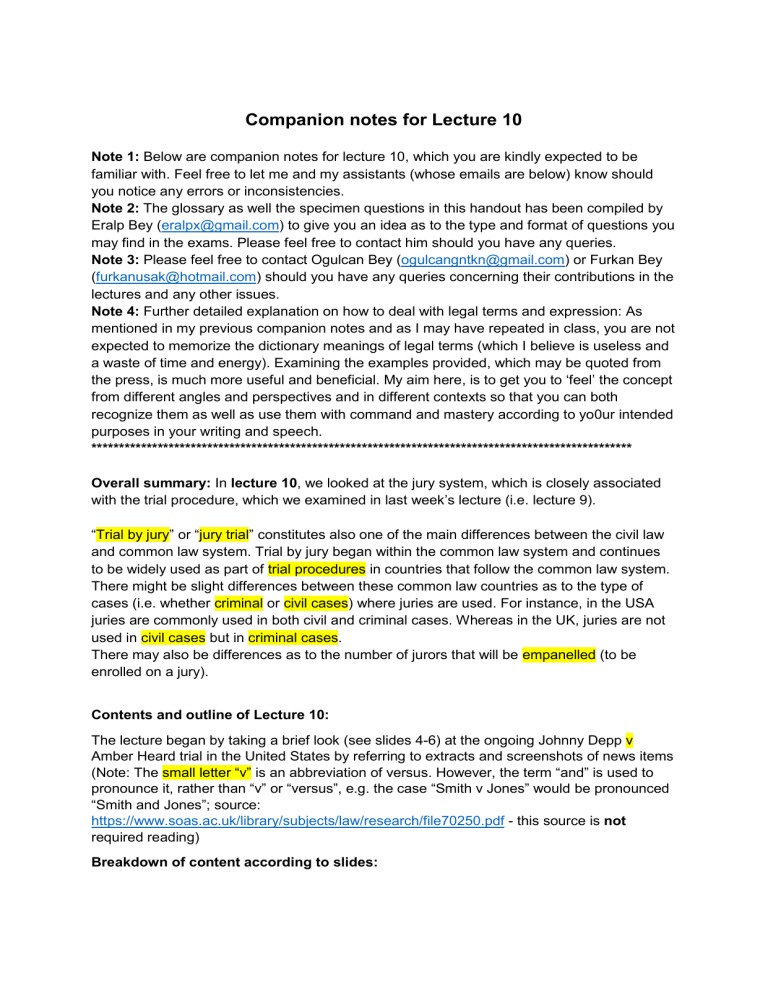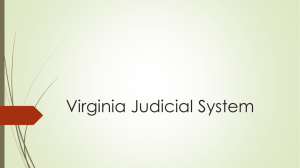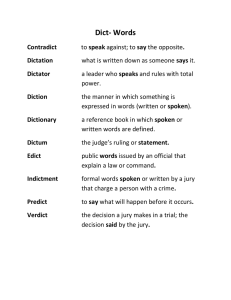
Companion notes for Lecture 10 Note 1: Below are companion notes for lecture 10, which you are kindly expected to be familiar with. Feel free to let me and my assistants (whose emails are below) know should you notice any errors or inconsistencies. Note 2: The glossary as well the specimen questions in this handout has been compiled by Eralp Bey (eralpx@gmail.com) to give you an idea as to the type and format of questions you may find in the exams. Please feel free to contact him should you have any queries. Note 3: Please feel free to contact Ogulcan Bey (ogulcangntkn@gmail.com) or Furkan Bey (furkanusak@hotmail.com) should you have any queries concerning their contributions in the lectures and any other issues. Note 4: Further detailed explanation on how to deal with legal terms and expression: As mentioned in my previous companion notes and as I may have repeated in class, you are not expected to memorize the dictionary meanings of legal terms (which I believe is useless and a waste of time and energy). Examining the examples provided, which may be quoted from the press, is much more useful and beneficial. My aim here, is to get you to ‘feel’ the concept from different angles and perspectives and in different contexts so that you can both recognize them as well as use them with command and mastery according to yo0ur intended purposes in your writing and speech. ************************************************************************************************** Overall summary: In lecture 10, we looked at the jury system, which is closely associated with the trial procedure, which we examined in last week’s lecture (i.e. lecture 9). “Trial by jury” or “jury trial” constitutes also one of the main differences between the civil law and common law system. Trial by jury began within the common law system and continues to be widely used as part of trial procedures in countries that follow the common law system. There might be slight differences between these common law countries as to the type of cases (i.e. whether criminal or civil cases) where juries are used. For instance, in the USA juries are commonly used in both civil and criminal cases. Whereas in the UK, juries are not used in civil cases but in criminal cases. There may also be differences as to the number of jurors that will be empanelled (to be enrolled on a jury). Contents and outline of Lecture 10: The lecture began by taking a brief look (see slides 4-6) at the ongoing Johnny Depp v Amber Heard trial in the United States by referring to extracts and screenshots of news items (Note: The small letter “v” is an abbreviation of versus. However, the term “and” is used to pronounce it, rather than “v” or “versus”, e.g. the case “Smith v Jones” would be pronounced “Smith and Jones”; source: https://www.soas.ac.uk/library/subjects/law/research/file70250.pdf - this source is not required reading) Breakdown of content according to slides: Slides 4-6: Johnny Depp trial: We looked at the latest developments in the ongoing legal case between Johnny Depp and Amber Heard. As we saw in last week’s lecture, the case is taking place in the US which follows the common law system. Hence, as is the norm in those countries, which belong to the common law family, the procedure for the trial is adversarial. Furthermore, as is common practice in the US (unlike in the UK), the case is being tried by a jury even where the case involves a civil dispute. In the UK, juries are not used in civil law cases but only in criminal law cases. Slides 7-10: Screenshots of official websites in US states where announcements about jury services are found on these slides. These screenshots contain important terms about juries as well as clear answers to many common questions. It is important to remember however that the information on these slides refer to the jury system in the United States. Please familiarize yourself with the terms and information on these slides. Slides 11-37: The extracts quoted on these slides contain relevant information about the history of the jury system in England. These extracts are from an article in the Independent newspaper that was published on 9 July 2018. I inserted additional explanatory slides where you will find references to specific jury terminology and other sources (e.g. Magna Carta). Please also carefully read related incidents in the article involving the experience of jury members and celebrities. Slides 38-39: A quoted legal joke on trial by jury with reference to the term “peer”. A closer examination of the Depp v Heard trial: I tried to break down the case and my explanations into small subsections in order to highlight main legal issues and components involved. My explanations are supplemented by references to current news items and short articles. Those articles or extracts which are required reading for the final exam are indicated as such. This case is very useful for our purposes since it is one that involves many important legal terms and concepts that we should all be familiar with. The case which has been dubbed as the “trial of the century” is a highly publicized and sensational one that is being reported all over the world. At the time of writing these notes the jury has retired (i.e. gone/withdrawn to the jury room for deliberations in private so as to return a verdict). It is most probable that we will have a verdict by the day of the exam final. I will, however, attempt to provide an in-depth summary of the whole saga and of the most recent case and provide my own feedback and expectations on the outcome of the case. In order to make it easier to grasp the significance of the case and the legal issues involved, I decided to break down the main issues in the case by subsections that I came up with as listed below: “Trial of the century” Background to the case (i.e. What is the case about?) Place of trial (i.e. Where is the ongoing trial taking place?) Jury number Projected outcome of trial and a guess as to the verdict No guilty verdict at end of civil trial Nicol J's judgment-correct, no appeal Will same decision be given by jury In turkey too many against president What is srand called not dock Debate about jury system Why in uk not for civil Defamation is civil not criminal; why “Trial of the century” and attention in the media: The Depp case is frequently referred to as the ‘trial of the century’ in the media. All media outlets are currently flooded with news of the Depp trial. The screenshot on slide 4 of lecture 10 will take you to one of many such articles – which you are NOT required to read for the exam. Background to the case: Depp was married to Depp from 2015 to 2017. Soon after the couple divorced, Heard wrote an article in the Washington Post in 2018 where she claimed she was a victim of domestic violence and abuse. Heard did not mention Depp’s name in the article. Four days after Heard’s article was published, Disney dropped Depp from his leading role as Captain Jack Sparrow in the multibillion-dollar “Pirates of the Caribbean” film series. The current trial in the US: The current trial is taking place in Fairfax County in the State of Virginia in the United States. Depp is suing Heard, 35, for defamation in Fairfax, Virginia, over a 2018 article she wrote for the Washington Post about surviving domestic violence. In that article, Heard referred to herself as a public figure representing domestic abuse. Depp denied all allegations of abuse and accused Heard of making up false allegations. Depp’s lawyer accused Heard’s claims to be a hoax (i.e. something that is meant to trick or deceive people). In response, Heard countersued Depp for $100 million. Notes: Please note the parts that are highlighted in yellow. To sue is a term that is used when only a civil case is concerned. When it’s a criminal case, the term ‘sue’ is not used. In criminal cases the term ‘prosecute’ is used. Depp is suing Heard for $50 million. This sum is relevant in determining the number of jurors in this case as explained further below. Heard is countersuing for $100 million. Both figures i.e. in the initial lawsuit by Depp as well Heard are for amounts that play a role in determining the number of jurors (in the particular State in the US and the type of case as explained below). ‘Allegations of abuse’ amount to a ‘defamation/libel’ case in law. In other words, the technical legal term when bringing such a case to court has to be either of these two terms. To defame is defined in the PDF Law Dictionary uploaded onto Moodle as follows: “to say or write things about the character of someone so as to damage his or her reputation” - see below for the distinction between libel and slander. Libel is defined in the same dictionary as “1. a published or broadcast statement which damages someone’s character _ She claimed that the newspaper report was a libel. 2. The act of making a libel _ action for libel, libel action case in a law court where someone says that another person has written a libel about him _ verb to damage someone’s character in writing or in a broadcast (NOTE: libelling – libelled. The US spelling is libeling – libeled.)” - see below for the distinction between libel and slander. Legal nature of the case: The case is generally referred to in the media as a ‘defamation’ case, which is not wrong. Legal websites and sources, however, refer to it as a ‘libel case’. This is because in law, written defamation is called ‘libel’, while spoken defamation is called ‘slander’. Therefore, technically speaking and according to the correct legal terminology this case is a libel case since it began as a result of an article that was written by Amber Heard and published in the Washington Post newspaper in 2018. In the UK and the US, a defamation case is a civil case and not a criminal case (https://hamiltonfraser.co.uk/knowledge/when-is-defamation-a-crime/. In some countries, including Turkey, defamation is a criminal offence and therefore will entail prosecution by the State. A civil case as opposed to criminal case: In this same article, one of the embedded links in red colour leads to other articles about the case. One of these is reproduced on slide 6 as a screenshot. This particular article provides important information about the nature of this case as well as the consequences involved for the party that will lose the case (https://inews.co.uk/inews-lifestyle/people/amber-heardprison-johnny-depp-trial-result-jail-sentence-explained-1632393?ico=in-line_link). The extracts below from the above article are REQUIRED READING FOR THE EXAM: “Could Amber Heard go to prison? Why the Johnny Depp trial will not result in a jail sentence for either party” The trial has become one of the most talked-about celebrity stories in years, with hundreds of thousands of people glued to live streams of courtroom proceedings every day The explosive defamation trial between Johnny Depp and Amber Heard has entered its final week. The trial has become one of the most talked-about celebrity stories in years, with hundreds of thousands of people glued to live streams of courtroom proceedings every day. Depp is suing Heard, his ex-wife, for $50m (£40m) over an article she wrote in The Washington Post in 2018, in which she described herself as a “public figure representing domestic abuse”. Heard did not name Depp in the article, but he claims it has cost him acting roles. She has counter-sued him for $100m, claiming Depp defamed her when his legal team referred to her claims as “fake” and a “sexual violence hoax”. The former couple, who were married from 2015 to 2017, both accuse the other of being physically violent during the relationship. They each deny the other’s claims. As the trial enters its final days here’s what we know about the possible outcomes. Could Amber Heard go to prison? No, Heard will not go to prison even if the jury decides in Depp’s favour. This is a civil trial, not a criminal case. Neither Heard nor Depp are being tried on any criminal charges. A civil case is a court case in which a person or entity (the plaintiff) can find another person or entity (the defendant) liable for some type of harm or wrongful act. When someone is sued, this is a civil case. If the plaintiff is successful, they will normally receive some form of compensation from the defendant. A civil lawsuit can be brought over anything from a contract dispute or a residential eviction to injuries sustained in a car accident, or countless other harms or disputes. In this case, Depp is suing Heard for defamation – the act of damaging someone’s reputation. Civil cases are intended to compensate the person who is harmed rather than punish the defendant. If the defendant loses a civil case they are not convicted of a crime, as they would be in a criminal case, and they do not face prison – even if they are found guilty of committing what would be a criminal act. The burden of proof is also lighter in a civil case than a criminal case. In a criminal case the defendant’s guilt must be proven “beyond reasonable doubt”, whereas in a civil case the jury simply has to decide which side of the dispute they believe to be more likely. Civil cases can also be settled out of court. The plaintiff and defendant’s lawyers will often debate and aim to come up with a sum that can be paid to defendant, ending the court case without a need for it to reach its resolution. Trial by jury: The Depp case is being tried by a jury in the United States, which means that the jury will make the ultimate decision as to who is telling the truth. The decision by the jury, as we have seen, is called a verdict. The previous case between Depp and Heard which was held in the UK did not involve a jury since jury trial is not used in civil cases the UK as opposed to the US. In the UK, a jury trial is only applicable in criminal cases not civil cases. Number of jurors: The jury in the Depp case is composed of seven people in total. As we know, the case is taking place in Fairfax County in the State of Virginia in the United States. We also, now know, that libel cases are civil cases in the US. Thus, in order to find out why there were only seven jurors, I conducted a search for the rules on jury composition in civil cases in Fairfax County in Virginia (as the same rules differ across different states in the US). According to the rules in Virginia State (https://www.fairfaxcounty.gov/circuit/jury/jury-duty-faq - NOT required reading): “If the amount claimed is $15,000 or less, the final jury will have five members. If it is more than $15,000, the jury will have seven members.” See last line on page 3 of the PDF titled “The answer book for jury service” under subsection titled “How are jurors chosen to sit on a jury in a civil case? (at https://www.vacourts.gov/courts/circuit/jury.pdf) – NOT required reading Since Depp is suing Heard for $50 million for the claims Heard has made in her article in the Washington Post and Heard is countersuing Depp for $100 million on the grounds that Depp’s lawyer called her claims to be a hoax, the monetary limit laid down in the rules is met. What type of verdict is required? The jury on the Depp case must come to a unanimous decision for a verdict. Once again, this requirement is determined in accordance with the rules in the State of Virginia as quoted from the above cited PDF document below: “Do we all have to agree? Yes. Every juror must agree on the verdict. This is known as a unanimous verdict. If the jury cannot agree, then the judge must declare a mistrial.” (at page 10 of the PDF document – NOT required reading) The jury will be deciding Depp’s claim and Heard’s counterclaim at the same time because they have been asked to make their minds up and give a verdict on the claims made by each party in the case. The previous case in the UK: What many sources do not refer to is that a case was held on exactly the same grounds in the UK before where Depp lost his case for libel. As mentioned above, there are no juries for civil cases in the UK. Civil cases are tried by a judge and not by a jury. Below are extracts in professional legal blogs that reported on the case in the UK at the time. The information I selected from those articles contain valuable legal information, which will provide you with a better insight on the legal background – these extracts are REQUIRED READING FOR THE FINAL EXAM: Depp v Heard: the perils of life-streaming and trial by TikTok (11.05.22): Depp is suing his former wife over allegations of domestic violence (note: this comment is in reference to the ongoing case in the US). The case is a sequel of sorts: in 2020 Depp unsuccessfully sued The Sun and one of its editors in London over similar allegations (note: the newspaper published an article where it referred to Depp as a “wife beater”; Depp sued the newspaper over this allegation; in that case in the UK, Heard appeared as a witness (i.e. not as a defendant) on behalf of the newspaper and claimed that the statements made in the article were true). Mr Justice Nicol (i.e. the judge who tried the case in the UK) found that the allegations were substantially true. Depp’s Hollywood career has since been on hold. Given Nicol J’s (i.e. the judge) reasoned finding (i.e. ruling/judgment that is backed up by detailed reasoning and justified legal arguments; gerekçeli karar in Turkish) and the higher burden for a libel claimant (i.e. a plaintiff, the one who brings the case to court) in the US, you could be forgiven for thinking that armchair commentators would be cautious about predicting a Depp victory mid-trial. However, if this is the case you are obviously not a TikTok user. Unlike the English proceedings, the US trial is being live-streamed. There has been a social media frenzy of TikTok and YouTube videos.” (https://www.brettwilson.co.uk/blog/depp-v-heard-theperils-of-life-streaming-and-trial-by-tiktok/ - you are NOT required to read the entire article on this link BUT READ ONLY THE EXTRACT ABOVE FOR THE EXAM) High Court finds wife-beating allegations against Johnny Depp to be substantially true. Should libel claimants be nervous? (10.11.20) The recent libel judgment handed down in Depp II v News Group Newspapers Ltd [2020] EWHC 2911 (QB) has made headlines around the world and has captured the attention of the public. It has also been a devastating personal blow for Mr Depp. He was faced with a libel claimant’s nightmare scenario: a Court finding that the defamatory allegations made against him, in this case that he beat his then wife, Amber Heard, causing her significant injury and to fear for her life, were true. That is not to mention the having to pay for not only his own legal fees (i.e. fees that he has to pay to his own lawyers), but for those of The Sun as well (a total figure estimated to be in the region of £5 million). Many have speculated the judgment (i.e. not a verdict since in this case it is the judge who decides) will end Depp's career in Hollywood. It was reported over the weekend that he has already quit the Fantastic Beasts franchise, apparently at the request of Warner Brothers. The lockdown (note: in reference to the pandemic) trial in July, dubbed ‘the trial of the century’, captivated many as salacious allegations went back and forth between Mr Depp and Ms Heard (pausing here, it's important to note that Ms Heard was a witness for The Sun and not a defendant herself). Many of the shocking revelations would never have made the light of day if Mr Depp had not sued The Sun and one of its editors for libel after it published an article on 27 April 2018 entitled “GONE POTTY How Can J K Rowling be "genuinely happy" casting wife beater Johnny Depp in the new Fantastic Beasts film?” (a version of the article can be found here). Indeed, many people were unlikely to even know about the allegations were it not for the suit (i.e. a case in civil law). In the wake of the ruling (and during the hotly contested trial) many therefore asked themselves: why did Mr Depp sue? Prospective defamation claimants, anxious to protect their own reputation, may have looked at the messy Court proceedings with Mr Depp and asked themselves whether taking action was worth that risk.” But do all claimants run the risk of the Johnny Depp scenario? The short answer is no. The risks to a claimant come down to various factors, and each matter will come with its own strengths and weaknesses. There are, however, some ways to tell at a relatively early stage whether a defamation proceeding may do significantly more harm than good. (https://www.brettwilson.co.uk/blog/high-court-finds-wife-beating-allegationsagainst-johnny-depp-to-be-substantially-true-should-libel-claimants-be-nervous/- you are NOT required to read the entire article on this link BUT READ ONLY THE EXTRACT ABOVE FOR THE EXAM) Case comment: Depp v NGN – an analysis of the judgment (14 December 2020) "As a claim for libel is brought in civil proceedings, the standard of proof that defendants (i.e. in this case the British newspaper) are required to meet is the balance of probabilities i.e. is it more probable than not that the article was substantially true in the meaning that it bore?. In this case, the Defendants (the British newspaper) had to show that it was more likely than not that the Claimant (i.e. Depp) did what the article alleged i.e. committed physical violence against his wife, causing significant injury and for her to fear for her life. In the common law, two standards of proof are recognised; the balance of probabilities and beyond a reasonable doubt. The latter applies in criminal cases and although the balance of probabilities is the single standard of proof in civil proceedings, the evidence required to satisfy it varies according to the circumstances. Where the allegation is one of ‘serious criminality’, the strength and quality of the evidence is highly relevant. Ms Heard was the Defendants’ key witness given it was her account that was likely to determine the outcome of the case. Neither Mr Wootton (i.e. the journalist who wrote the article in the newspaper) nor any other journalist at the Sun gave evidence in the case. The Judge also rejected the Claimant’s (i.e. Depp) narrative that Mr Heard was a ‘nothing more than a gold-digger’, recognizing, amongst other evidence, that her donation of her $ 7 million to charity did not match with the Claimant’s characterisation of his ex-wife. This case was dubbed the ‘trial of the century’ and indeed, it captured the attention of the public, making headlines around the world during a global pandemic.” (https://www.bindmans.com/insight/blog/case-comment-depp-v-ngn-an-analysis-of-thejudgment - you are NOT required to read the entire article on this link BUT ONLY READ THE EXTRACT ABOVE FOR THE EXAM) My own projection as to the outcome of the case: In view of the judge’s findings in the previous court case in the UK, it would seem likely that the verdict might also be in favour of Amber Heard in the US. On the other hand, it is important to note that this time in the US, the verdict will be given by a jury and not by a judge, which should not make a significant difference since the jury is only expected to return a verdict based on the facts that were presented in court. On the other hand, it might not be easy for the jury to not be influenced by the performance not only of the lawyers in court but also of the reactions of Depp and Heard in the courtroom. A recent article provides interesting insight into how the views in the media might have shaped the public opinion: “No matter who 'wins' the Johnny Depp-Amber Heard trial, America has lost” (https://www.msnbc.com/opinion/msnbc-opinion/johnny-depp-amberheard-trial-verdict-we-ve-all-lost-n1295801). The writer notes: “Ultimately the jury will decide whom they believe is telling the truth. But I’m less interested in whether Heard is a liar and more interested in why so many people are gleefully invested in the idea that she might be. Millions of people seem suddenly interested in domestic violence — but only because there’s a chance a scorned and vengeful woman might be lying about it.” – NOT required reading for the exam)



